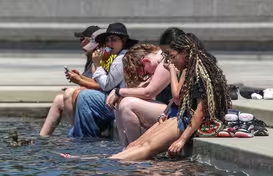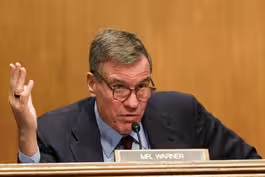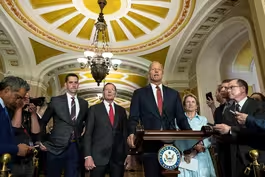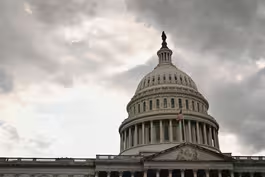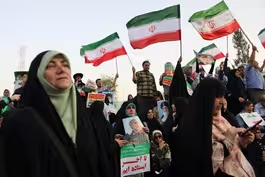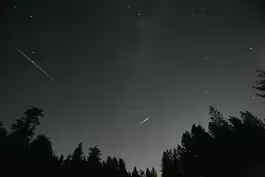
Israel-Iran ceasefire holds as Trump lashes out at both
Clip: 6/24/2025 | 9m 39sVideo has Closed Captions
Fragile Israel-Iran ceasefire holds as Trump lashes out at both sides
President Trump is in the Netherlands for the NATO summit as the ceasefire between Iran and Israel is holding. Israel described enormous damage to Iran’s nuclear program. But PBS News Hour learned an initial U.S. assessment of the damage caused by the American bombing of 3 Iranian nuclear sites suggests the sites have not been as destroyed as Trump has claimed. Nick Schifrin reports.
Problems playing video? | Closed Captioning Feedback
Problems playing video? | Closed Captioning Feedback
Major corporate funding for the PBS News Hour is provided by BDO, BNSF, Consumer Cellular, American Cruise Lines, and Raymond James. Funding for the PBS NewsHour Weekend is provided by...

Israel-Iran ceasefire holds as Trump lashes out at both
Clip: 6/24/2025 | 9m 39sVideo has Closed Captions
President Trump is in the Netherlands for the NATO summit as the ceasefire between Iran and Israel is holding. Israel described enormous damage to Iran’s nuclear program. But PBS News Hour learned an initial U.S. assessment of the damage caused by the American bombing of 3 Iranian nuclear sites suggests the sites have not been as destroyed as Trump has claimed. Nick Schifrin reports.
Problems playing video? | Closed Captioning Feedback
How to Watch PBS News Hour
PBS News Hour is available to stream on pbs.org and the free PBS App, available on iPhone, Apple TV, Android TV, Android smartphones, Amazon Fire TV, Amazon Fire Tablet, Roku, Samsung Smart TV, and Vizio.
Providing Support for PBS.org
Learn Moreabout PBS online sponsorshipGEOFF BENNETT: Welcome to the "News Hour."
President Trump is in the Netherlands tonight in advance of tomorrow's NATO Summit, while, in the Middle East, the cease-fire between Iran and Israel is holding.
Israel tonight described enormous damage to Iran's nuclear program, but the "PBS News Hour" has learned an initial U.S. assessment of the damage caused by the American bombing of three Iranian nuclear sites suggests the sites have not been as destroyed as President Trump has claimed.
Nick Schifrin is in The Hague tonight and begins with the apparent end of fighting between Israel and Iran.
NICK SCHIFRIN: In Tehran, a tense quiet the city hasn't seen in nearly two weeks, a fragile cease-fire now holding after final strikes leading up to the truce.
Israel said it hit dozens of Iranian missile launchers and military targets.
And in the largest city in Southern Israel, a barrage of Iranian ballistic missiles tore off the top floors of this apartment building,at least four killed, dozens wounded, but some survivors rescued from the rubble by Israeli firefighters.
YEHEZKIEL CHERI, Beersheba, Israel, Resident (through translator): I went out during the siren and, in the middle of the building, when I was going toward the safe room, it blew up.
I saw something close to me.
I saw fire in front of me.
NICK SCHIFRIN: It was the final Iranian strike before the cease-fire, but Israel says it kept firing interceptors, including this one that fell in Northern Israel, and accused Iran of two cease-fire violations.
That's when Israeli chief of the general staff, Eyal Zamir, warned: "In light of the severe violation of the cease-fire carried out by the Iranian regime, we will respond with force."
Quickly, President Trump called Israeli Prime Minister Benjamin Netanyahu and made a demand in private and online: "Israel, do not drop those bombs.
If you do, it is a major violation.
Bring your pilots home now."
Forty minutes later, he wrote: "Israel is not going to attack Iran.
All planes will turn around and head home."
Israel restricted its bomb targets to an Iranian radar installation.
That wasn't good enough for President Trump, whose own bomb started with F. DONALD TRUMP, President of the United States: I'm not happy with Israel.
When I say, OK, now you have 12 hours, you don't go out in the first hour and just drop everything you have on them.
So I'm not happy with them.
I'm not happy with Iran either.
But I'm really unhappy if Israel is going out this morning because of one rocket that didn't land, that was shot, perhaps by mistake, that didn't land.
I'm not happy about that.
We have -- we basically have two countries that have been fighting so long and so hard that they don't know what the (EXPLETIVE DELETED) they're doing.
Do you understand that?
NICK SCHIFRIN: That unprecedented public anger at Israel preceded President Trump on Air Force One.
Two days after raising the possibility of Iranian regime change, he ruled it out.
QUESTION: Do you want to see regime change in Iran?
DONALD TRUMP: No.
If there was, there was, but, no, I don't want to.
I'd like to see everything calm down as quickly as possible.
Regime change takes chaos.
And, ideally, we don't want to see so much chaos.
So we will see how it does.
The Iranians are very good traders, very good businesspeople, and they got a lot of oil.
They should be fine.
They should be able to rebuild and do a good job.
They're never going to have nuclear, but other than that they should do a great job.
NICK SCHIFRIN: Israeli officials are ecstatic with the war's results, degrading Iran's nuclear program and missile inventory and proving they could fly freely over Tehran, as Netanyahu said tonight.
BENJAMIN NETANYAHU, Israeli Prime Minister (through translator): We achieved a historic victory, and this victory will stand for generations.
We removed from upon us two immediate existential threats, the threat of annihilation by nuclear bombs and the threat of annihilation by 20,000 ballistic missiles.
NICK SCHIFRIN: As for President Trump after landing in the Netherlands, he held a family photo with what he called his -- quote -- "very good European friends."
As he put it tonight: "It will be much calmer in The Hague than what I went through with Israel and Iran."
GEOFF BENNETT: And Nick joins us now from The Hague.
Nick, I understand there's a bit of a technical delay between us, but tell us what more you learned about this initial U.S. assessment of the damage done to Iran's nuclear sites.
NICK SCHIFRIN: Geoff, according to two officials I spoke to who have knowledge of the assessment, the assessment states that the nuclear facilities have not been obliterated and Iran could gain access to them eventually.
Geoff, there was a robust debate before these strikes, according to the officials I have spoken to, about whether these bunker-busting bombs could be as effective as some people were saying they were, especially on the Fordow nuclear site, which is buried underground.
This initial assessment, I'm told, indicates those concerns among the people who had concerns about the weapons' impact were more legitimate than some gave them credit -- credence to.
All that said, Geoff, the assumptions that would support an assessment that the program is set back by only a few months don't take into account, I'm told, multiple variables, including, does Iran have enough scientists after Israel killed many of them?
Does Iran choose to work at these sites 24/7 knowing that Israel or the U.S. could attack?
And one official says that, if the U.S. or Israel is willing to take another strike, then, in fact, the assessment says that the program is still set back years.
That said, this is an initial assessment, Geoff.
They often change.
And senior administration officials tonight are still insisting that the program -- quote -- "has been obliterated."
GEOFF BENNETT: Well, let's shift our focus to NATO, Nick, which kicks off in earnest tomorrow.
What is tomorrow's summit expected to announce?
NICK SCHIFRIN: Geoff, the headline out of here is a number, 5 percent.
That is the number that all 32 members of NATO have agreed to spend in terms of their defense spending of GDP within the next decade.
What does that include?
Three-point-five percent of their GDP on weapons, including for Ukraine, and 1.5 percent of what's being described as defense-related, everything from cybersecurity to infrastructure like bridges that can carry tanks.
Never before have NATO members agreed to this level of spending.
The previous goal, 2 percent made back in 2014, even today some don't meet.
Much of this increased spending, Geoff, has come because of the threats that NATO faces today, especially from Russia.
Since that full-scale invasion that Russia launched in 2022, European officials tell me Russia has reconstituted its defense industrial base, to the point where it can build weapons that go beyond what Russia needs to wage war in Ukraine.
But, here, Secretary-General Mark Rutte has been very clear that he credits NATO's increased defense spending on pressure from President Trump.
MARK RUTTE, NATO Secretary-General: Do you really think, if Donald Trump would not have been president, that the world would get -- we would get to the 5 percent?
Are you really thinking that?
I am not.
NICK SCHIFRIN: This conference is designed to prevent any kind of Trump blowup.
It's very short.
And unlike in previous summits, Geoff, Zelenskyy, the president of Ukraine, is not invited to the main leaders meeting.
GEOFF BENNETT: So does that suggest, Nick, that despite this agreement on spending, that European officials are concerned about the U.S.' continued commitment to NATO?
NICK SCHIFRIN: It definitely does.
As you and I have talked about for the last month, senior European officials continue to tell me that they are concerned about President Trump's commitment to European defense, most notably about Ukraine.
Biden era weapons are running out for Ukraine, and the Trump team has not indicated any interest in spending more money to arm Ukraine.
Second is the divergence about the assessment of Russia.
We just talked about the threat that Russia poses militarily.
But, today, Trump once again said he wanted to make a deal with Russia.
And, recently, Deputy Secretary of State Chris Landau wrote on X in a post that's now deleted NATO is -- quote - - "still a solution in search of a problem."
And then there's European concerns the U.S. will withdraw some of its troops from Europe.
A senior European military official told me today the new spending requirements assume that the U.S. will keep its troop levels in Europe.
President Trump today perhaps reinforced some of these European concerns when he would not commit to NATO's bedrock Article 5 that all member countries would come to any other member country's defense if attacked.
QUESTION: Are you still committed to Article 5 of NATO?
DONALD TRUMP: It depends on your definition.
There's numerous definitions of Article 5.
You know that, right?
But I'm committed to being their friends.
I have become friends with many of those leaders.
And I'm committed to helping them.
QUESTION: Are you still committed to mutual defense?
DONALD TRUMP: I'm committed to saving lives.
I'm committed to life and safety.
NICK SCHIFRIN: European officials say there is only one definition of Article 5, and that is collective defense, in which the United States would need to be willing to go to war for Europe.
And without that commitment, they say, Geoff, the alliance is weaker.
GEOFF BENNETT: Nick Schifrin reporting from The Hague tonight.
Nick, our thanks to you.
How proposed cuts to Medicaid could affect rural hospitals
Video has Closed Captions
Clip: 6/24/2025 | 4m 3s | How proposed cuts to Medicaid could affect rural hospitals (4m 3s)
News Wrap: 160 million enduring brutal U.S. heatwave
Video has Closed Captions
Clip: 6/24/2025 | 4m 49s | News Wrap: 160 million enduring brutal conditions in U.S. heatwave (4m 49s)
Sen. Warner questions delay of Iran strike briefing
Video has Closed Captions
Clip: 6/24/2025 | 7m 17s | Sen. Warner questions administration's delay of Iran strike briefing (7m 17s)
Time running out for GOP to pass tax plan by Trump deadline
Video has Closed Captions
Clip: 6/24/2025 | 4m 38s | Time running out for GOP to pass massive tax and spending plan by Trump's deadline (4m 38s)
Trump's attempt to claw back funding, explained
Video has Closed Captions
Clip: 6/24/2025 | 7m 23s | Trump's attempt to claw back funding approved by Congress, explained (7m 23s)
What's next for Iran's regime? Analysts weigh in
Video has Closed Captions
Clip: 6/24/2025 | 7m 30s | What's next for Iran's regime after U.S. strikes and Israel ceasefire? Analysts weigh in (7m 30s)
White House set to roll back national forest protections
Video has Closed Captions
Clip: 6/24/2025 | 6m 54s | White House set to roll back protections for nearly 60 million acres of national forests (6m 54s)
Providing Support for PBS.org
Learn Moreabout PBS online sponsorshipSupport for PBS provided by:
Major corporate funding for the PBS News Hour is provided by BDO, BNSF, Consumer Cellular, American Cruise Lines, and Raymond James. Funding for the PBS NewsHour Weekend is provided by...

